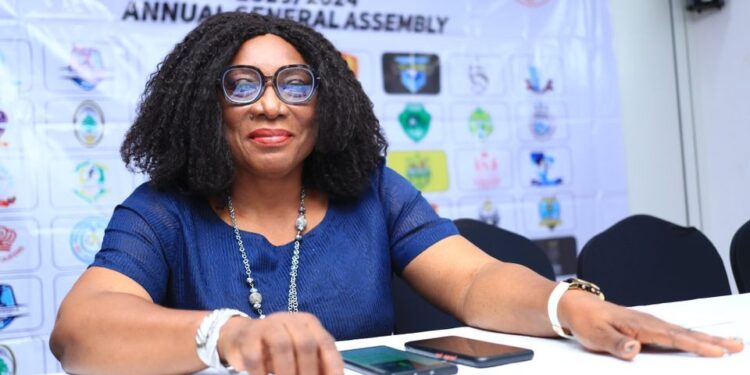“Wow! Your tenure shall always serve as a reference point of success just as it marked the beginning of a major turnaround witnessed in women’s football in Nigeria. Congratulations ma!” — Mr. Oladapo Akande, Editor, EduTimes Africa
Those were the heartfelt words of Mr. Oladapo Akande, Editor of EduTimes Africa, as the Chairperson of the Nigeria Women Football League (NWFL), Nkechi Obi, officially bowed out following the expiration of her board’s two-year tenure.
In a landmark memo addressed to the President of the Nigeria Football Federation (NFF), Obi not only confirmed the end of her tenure but also presented a detailed, transparent report of achievements—an unprecedented move in Nigerian football administration.
Transformational Tenure: Growth and Expansion
Obi’s leadership, which began in mid-2023, is already being hailed as one of the most impactful in NWFL’s 33-year history. A major milestone was the expansion of the NWFL Premiership from 14 to 20 clubs, set to take effect in the 2025/2026 season. The second-tier Championship League also grew from 12 to 20 teams.
At the grassroots level, the Nationwide League was restructured into a States League, launching in August 2025 with over 150 clubs from 30 states poised to participate.
These changes were driven by the board’s “Women’s Football Rising” campaign, aimed at growing the pool of registered female footballers from 450 in 2023 to over 5,000 by year-end 2025.
Media Visibility and Digital Breakthroughs
For the first time in history, all NWFL Super 6 matches were broadcast live in 2024 and 2025. Live streaming was also introduced for the Championship League, allowing fans across the globe to engage with the matches.
This leap in media coverage led to a surge in digital followers across platforms including Facebook, Instagram, X (formerly Twitter), and TikTok. The NWFL also established a presence on LinkedIn, attracting corporate attention and sponsorship opportunities.
Financial Recovery and Corporate Interest
Faced with a ₦25 million deficit at the beginning of her tenure, Obi and her team achieved a financial turnaround, recording a ₦3 million surplus by 2024. Further growth is expected in 2025.
In another historic first, the 2025 Super 6 Tournament was sponsored by a privately owned club, symbolizing a shift from the state-funded model. The number of private clubs in the Premiership rose from 2 to 5 in just two years—an indication of growing private sector confidence.
Player Welfare and National Impact
Obi’s board increased the minimum player salary from ₦30,000 to ₦80,000, setting a new standard for athlete welfare. The NWFL also became a crucial talent pipeline for national teams such as the Super Falcons, Falconets, and Flamingoes.
Nigeria’s return to the CAF Women’s Champions League saw a commendable showing in 2024, with Bayelsa Queens tipped for greater success in the upcoming edition.
Handing Over with Integrity and Vision
Although her term has formally ended, Obi confirmed that preparations for the upcoming States League and final Championship fixtures are in full gear. She has tasked the NWFL’s Chief Operating Officer with compiling a comprehensive handover package and financial report for the incoming board.
In her closing remarks, she called on the NFF Executive Committee to swiftly reconstitute a new NWFL Board to sustain and advance the league’s development.
“As we bow out, I am proud of what we accomplished together,” Obi wrote. “We’ve built a foundation that I hope future boards can build on.”
Her departure marks the end of a transformative era in Nigerian women’s football—one that will undoubtedly remain a reference point for progress and leadership in the sport.



















































































 EduTimes Africa, a product of Education Times Africa, is a magazine publication that aims to lend its support to close the yawning gap in Africa's educational development.
EduTimes Africa, a product of Education Times Africa, is a magazine publication that aims to lend its support to close the yawning gap in Africa's educational development.